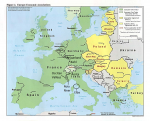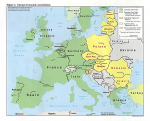The US ends up having to manage its European policy with a pissed off Germany, Italy, and even France (pissed off over having to give up colonies and blaming any unrest in other colonies, rightly or wrongly, on the changes in Indochina). Britain, Belgium, Netherlands, Spain, and Portugal will also be a bit suspicious of what "ideas" the US will come up with next.
Among the general public among the peoples of Indochina American support for transition to independence will generate a feeling of warmth and goodwill to the United States. If the US forces a compromise granting the French some basing rights, that would likely become a point of Franco-Vietnamese/Indochinese friction in the years ahead, and America will catch blame from both sides for that. Local factions in Vietnam, Laos and Cambodia will be seeking power for themselves, most notably, Ho Chi Minh's Viet Minh coalition. Once America has taken the lead and irrevocably committed to its Indochina policy, the USSR and Republic of China will, without risk or cost, voice support for it and say it is a good idea. They won't get much blame from the French or others because the US will be seen as the instigator.
The Viet Minh party in the mid-late 1940s will be happy to be friendly with and take money from both the USA and USSR. It will send thank you notes with some sincerity, but will feel that Uncle Sam doesn't have a right to attach strings. Viet Minh (and other Vietnamese) will be happy with Americans as much as they send cash, but get more irritated the more any Americans try to "manage" a "transition" to tell the Viet Minh what to do or not do with other Viets lives and property at home or make demands for Vietnam to make stands at odds with other friends like the Soviet Union. If the US persists in demands like that the Viet Minh will tell them to take a hike.



